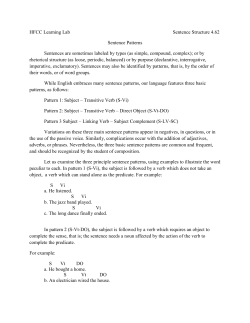
Reported Speech
Reported Speech and Reporting verbs We can report what people say with direct speech (in inverted commas “…” Or reported speech. Complete the indirect speech … Direct speech Indirect Speech • • • • • • • • • • • • “Why are you late?” “We are trying to manage.” “I booked it last week.” “Have you been to Spain?” “I won’t be able to come.” We can come tomorrow.” He asked me why… He said they… He said he … She asked if … She said she … They said they … Complete the indirect speech … Direct speech • • • • • • “Why are you late?” “We are trying to manage.” “I booked it last week.” “Have you been to Spain?” “I won’t be able to come.” We can come tomorrow.” Indirect Speech • He asked me why I was late. • He said they were trying to ... • He said he had booked it last week. • She asked if I had been to Spain • She said she wouldn’t be able to come. • They said they could come tomorrow. What is the tense change? Direct speech • Present simple • Present continuous • Past simple • Present perfect • Will (future) • can Indirect speech • … • … • … • … • … • … Direct speech • Present simple • Present continuous • Past simple • Present perfect • Will (future) • can Indirect speech • Past simple • Past continuous • Past perfect • Past perfect • Would • could Note: • Would, could, should, might and ought to stay the same. (no transformation in tenses) example: • “I would like to solve the problem as soon as possible.” • She said that she would like to solve the problem as soon as possible. • Must changes to had to • Mustn’t stays the same (doesn’t change) With orders, advice and requests: • We use the infinitive after the object. Eg: “Call me back later.” She asked him to call her back later. Eg: “Don’t worry” My manager told me not to worry. Eg: Can/could you help me? I asked him to help me. Remember • You usuallly have to change pronouns. • “I like…” she said she liked. • If you report what someone said on a different day or in a different place, some time and place words can change: eg. Tomorrow becomes the next day here becomes there This becomes that Direct questions • “What’s your name?” Indirect questions • She asked him … • “Where do you live?” • She asked him … • “Do you speak English?” • She asked him … • “Are you employed?” • She asked him… Direct questions • “What’s your name?” • “Where do you live?” • “Do you speak English?” • “Are you employed?” • Where did you work before? Indirect questions • She asked him what his name was. • She asked him where he lived. (do not use do) • She asked him whether/if he’d (had) phoned. • She asked him whether /if he was employed. • She asked him if he had worked before. Reporting Verbs • Structures after reporting verbs: • After reporting verbs there are different patterns using the gerund or infinitive: • Example: 1. Jude offered to drive me to the airport. 2. I promised not to tell anybody. 3. The doctor advised me to have a rest. 4. I persuaded my sister not to sign the contract. 5. I apologised for being so late. 6. The police accused Karl of stealing the car. • There are two ways to report: With say or with a reporting verb: Jude said he would drive me to the airport. Or Jude offered to drive me to the airport. 1) Reporting verb + to + infinitive • • • • • Agree Offer Refuse Promise Threaten + (Not) to do something 2 ) reporting verb + person + to + infinitive • • • • • • • • • advise ask convince Encourage Invite Persuade Remind Tell warn + somebody (Not) to do something 3 ) reporting verb +ing form • • • • • • • • • Apologized for Accused sb of admit Blame sb for deny Insist on recommend regret suggest + (Not) doing something In negative sentences • Use the negative infinitive (not to be) • Use the negative gerund (not being) Eg: He reminded me not to be late. Eg: She regretted not going to the interview. Report the direct speech using the reporting verbs: • “I’m sorry I was rude” (apologize) • “Shall I prepare the meeting?” (offer) • “I don’t think you should sign the contract” (advised) • “I’m going with you to see a doctor” (insist) Report the direct speech using the reporting verbs: • “I’m sorry I was rude” She apologized for being so rude. • “Shall I prepare the meeting?” She offered to prepare the meal • “I don’t think you should sign the contract” She advised me not to sign the contract. • “I’m going with you to see a doctor” She insisted on going to see a doctor with me.
© Copyright 2025





















